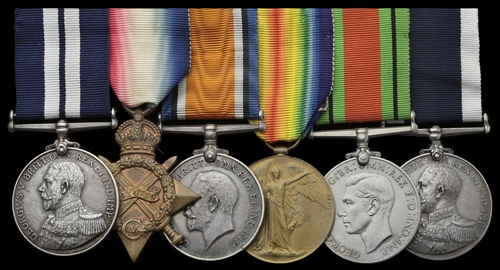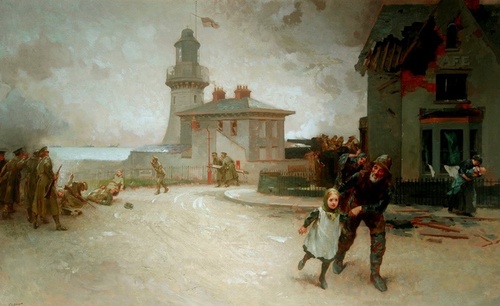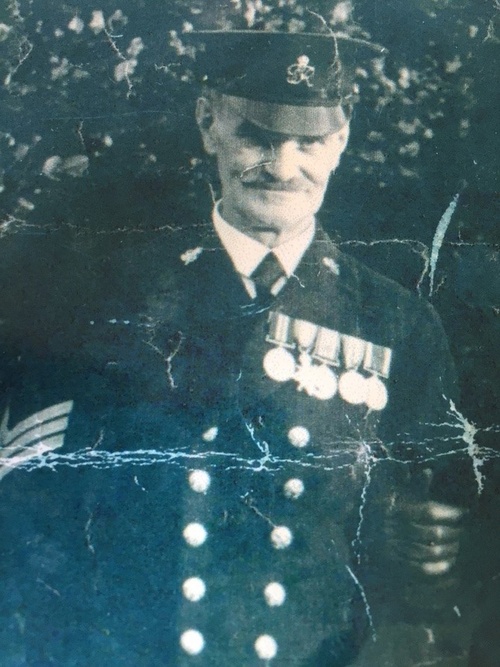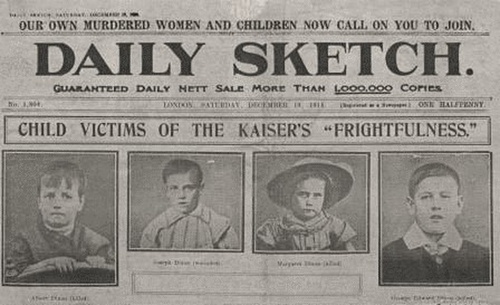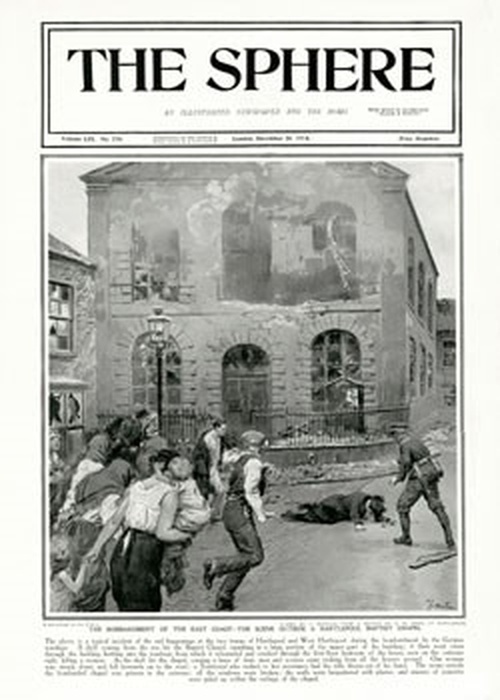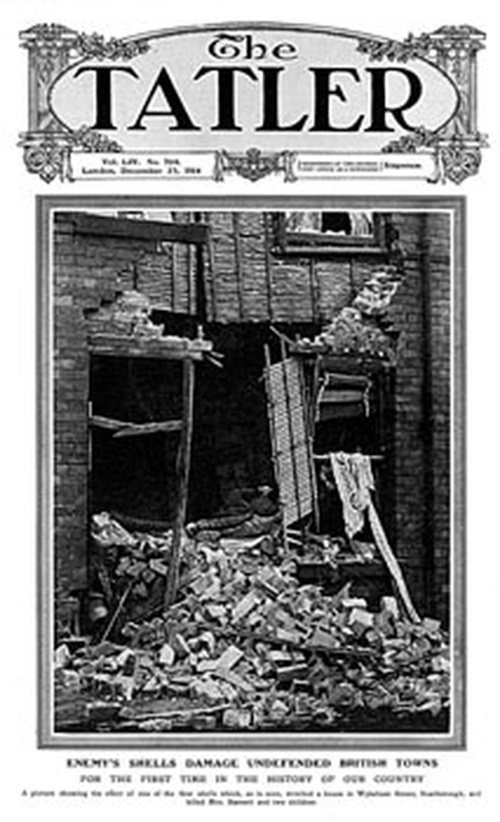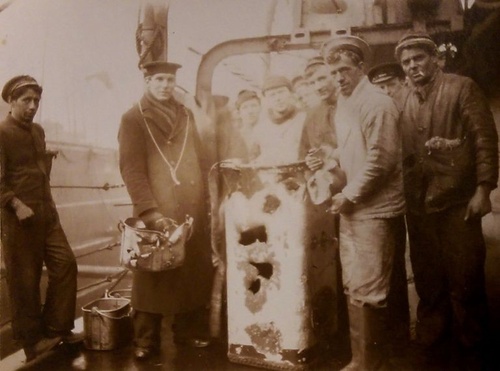Auction: 22003 - Orders, Decorations and Medals
Lot: 359
16 DECEMBER 1914: THE BOMBARDMENT OF HARTLEPOOL
'The world should know how Hartlepool coped, we're tough you know and what happened that day, we all got back on our feet in no time - good people, tough folk.'
Myra Docherty, a survivor of the German bombardment of Hartlepool, speaks her mind.
An outstanding Great War D.S.M. group of six awarded to Petty Officer W. W. Morgan, Royal Navy, who was wounded in H.M.S. Patrol on the occasion of the Imperial German Navy's infamous attack on Hartlepool on 16 December 1914
On that date - in an act that attracted international outrage and condemnation - Admiral Hipper's cruisers indiscriminately bombarded the seaside towns of Hartlepool, Scarborough and Whitby: 137 people were killed, including 78 women and children, and a further 592 people were injured, including 228 women and children, the vast majority of them from Hartlepool
Patrol was one of a handful of ships that sallied forth - under fire - from Hartlepool's tidal harbour and was hit by a brace of Blücher's 8.2-inch shells and straddled by 11-inch projectiles from other enemy battle cruisers: four of her ratings were killed
Distinguished Service Medal, G.V.R. (191050 W. W. Morgan, P.O., H.M.S. Patrol, Patrol Services 1915-16); 1914-15 Star (191050 W. W. Morgan, P.O., R.N.); British War and Victory Medals (191050 W. W. Morgan, P.O., R.N.); Defence Medal 1939-45; Royal Navy L.S. & G.C., G.V.R. (191050 W. W. Morgan, P.O., H.M.S. Patrol), generally very fine (6)
D.S.M. London Gazette 22 May 1917. The original recommendation states:
'This Petty Officer has been borne in H.M.S. Patrol since the commencement of hostilities, as Flotilla Gunner's Mate, and has carried out his duties with marked ability, continually going out in destroyers to assist in the instruction of Gun-layers. Whilst H.M.S. Patrol was in the Tyne he also had to instruct all the crew of the auxiliary patrol vessels.
He displayed coolness in the Fore Control when under fire from German battle cruisers [off Hartlepool on 16 December 1914] and received injuries to the drums of his ears through a shell exploding over the bridge.'
William Walter Morgan was born in Portsmouth, Hampshire on 18 May 1881 and entered the Royal Navy as a Boy 2nd Class in October 1896. By the outbreak of hostilities in August 1914, he was serving as a Petty Officer in the scout cruiser H.M.S. Patrol, and he remained similarly employed until April 1918.
In the early morning hours of 16 December 1914, Admiral Hipper's plan to bombard the seaside towns of Hartlepool, Scarborough and Whitby came to fruition, when he divided his battle cruisers into two forces: the Seydlitz, Blücher and Moltke proceeded to Hartlepool, whilst the Derfflinger, Von der Tann and Kolberg proceeded to Scarborough. The latter force shelled the town from 8 a.m. to 9.30 a.m. with resultant casualties. It then proceeded to Whitby, where the coast guard station and famous abbey came under fire.
It was at Hartlepool, however, that the most serious damage was inflicted, the indiscriminate broadsides of the Seydlitz, Blücher and Moltke causing local civilian casualties of 86 killed and 424 injured. Further evidence of the ferocity of the bombardment was reflected in the town's smashed infrastructure, dozens of buildings - including seven churches - being demolished or severely damaged. No less than 1100 enemy shells had found their mark.
H.M.S. Patrol, under the command of Captain Alan Bruce, R.N., berthed at Hartlepool on the eve of the enemy attack, together with her consort Forward, four destroyers of the 9th Flotilla and H.M. Submarine C 9. At low tide it was difficult for the cruisers to get out to sea, so it fell to the destroyers to enact the Royal Navy's opening response to the raiders on 16 December 1914.
At 0800 the destroyers sighted the German battlecruisers Seydlitz and Moltke and the armoured cruiser Blücher, preparing for their bombardment. Having chased off the hopelessly outgunned destroyers, the enemy cruisers opened fire on Hartlepool's two coastal artillery batteries, which mounted three 6-inch guns, before bombarding the port and harbour entrance.
Captain Bruce attempted to leave the harbour but was quickly engaged by Blücher in the channel to the open sea and Patrol was hit by two 8.3-inch shells. Four men were killed and seven wounded, including Morgan, and, badly holed, Patrol made for Middlesbrough docks.
Subsequent career
Morgan, who ended the war with an appointment in Wallington, was advanced to Chief Petty Officer in March 1919 and was pensioned ashore in July 1921.
Subject to 20% VAT on Buyer’s Premium. For more information please view Terms and Conditions for Buyers.
Sold for
£2,100
Starting price
£1000

